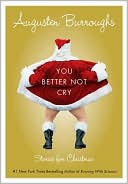

 |

|

The average rating for You Better Not Cry: Stories for Christmas based on 2 reviews is 4.5 stars.
Review # 1 was written on 2019-12-11 00:00:00 Gunther Mainhardt Gunther MainhardtFind all of my reviews at: After recently coming off a Burroughs' induced Halloweeny high from the delightful Toil & Trouble, there was no chance I was going to let the holiday season go by without picking this one up. Once again this selection of stories reminded me of my Darling David in that the snapshots of life may have contained some dark aspects and the storyteller might have been a bit of a Negative Nelly, but the humor and sentimentality worked to (for the most part) keep spirits bright. Included in this collection are tales about: Eating Santa's face - without ingesting some bathsalts first; Building a gingerbread house tenement; Asking for a pony; Waking up hungover at the Waldorf Astoria next to Santa; Waking up in a gaggle of homeless people; Waking up to find your dream house flooded; and George. Oh George . . . . . That one was a heartbreaker. Kudos to you AB for making me have a feel. And for being my kindred spirit when it comes to the advent calendar . . . . My mother surely must have regretted ever introducing me to the advent calendar, because now she could never take it away. It would be like getting your child hooked on heroin and then withholding their needle. For the last eighteen days, it had been the single focus of my life. My mother would not allow me to open a new door before eight o'clock in the evening. By seven each night, I was sitting on the floor in front of the refrigerator like a dog, staring up at the calendar and asking her every few minutes, "Is it almost eight o'clock?" Luckily I'm the adult in my house (and the advent calendar belongs to me because my children are Grinches who only are interested in Christmas for the presents and spend the rest of their lives holed up in their rooms), so I open the day's little door as soon as I get up each morning . . . . |
Review # 2 was written on 2009-12-03 00:00:00 Ben Rawles Ben RawlesIn the realm of today's gay memoirists, there are two legends: David Sedaris and Augusten Burroughs. David Sedaris (The Santaland Diaries, Naked, When Engulfed in Flames) tells charming, quaint stories to his wacky Geek family. His stories include odd jobs (being a holiday elf for Macy's) and strange stories that hide a sweet humanity (like when his sister brought a hooker home for the holidays in "Dinah the Christmas Whore.") Sedaris is kooky but cuddly; he started telling his stories on National Public Radio; people can titter at the unusualness, but still be captivated by his warmth. Burroughs has gone a slightly different route. His mom was a drunk with a long history of mental problems; she once turned him over to be raised by a mentally instable psychologist (as captured in the bestseller Running with Scissors). Burroughs' dad was a distant drunk whose infrequent messages of love were also scary and threatening. Augusten's older brother has Asbergers, a mild autism that makes people mechanically gifted but socially awkward and frigid. Augusten himself suffered through drug and alcohol addiction that made him lose high-paying jobs and once had him purposefully living on the streets with the homeless (in the book Dry). As a whole, Sedaris is more Mark Twain, Burroughs is slightly more Edgar Allen Poe, I guess. Sedaris can tell a joke and turn a phrase, but Burroughs is better known for asking complex questions and creating thought-provoking stories. We may think Sedaris and his cute stories might have cornered the fuzzy-cuddly holidays. With You Better Not Cry, Burroughs challenges that idea. Burroughs again offers us a collection of holiday stories; they fill in gaps in Burroughs' dark family history and drug addiction. These stories also together define a gay man who comes to reclaim holidays which were once taken from him and sullied seemingly beyond repair. In the end, Burroughs lets us see that each of us has a right to a merry Yule; he speaks to the disenfranchised and lonely among us more than Sedaris does. I'm probably making You Better Not Cry humorless. Yet, Burroughs has a lot of comedy, couched in between the tales of dearth, death and dysfunction. As a child, Augusten believed Jesus and Santa were the same person, and in hilarious example, his Pentecostal grandma tries to set the poor boy right. Later, after a few days using the homeless for warmth (literally), Burroughs tries to remember the events of his catastrophic blackout; seemingly puzzling pieces like an empty bank account are only answered by the worship Augusten receives from the other alcoholics and drug addicts living on the street. Yes, You Better not Cry is funny, but in a dark, sardonic way. However, this grimness promises to pack a deeper, more meaningful wallop. In ugly times when many of us face scant, hollowed-out holidays, Burroughs book tells a story of hope, that each of us has the power to reclaim the warmth of the season. |
CAN'T FIND WHAT YOU'RE LOOKING FOR? CLICK HERE!!!